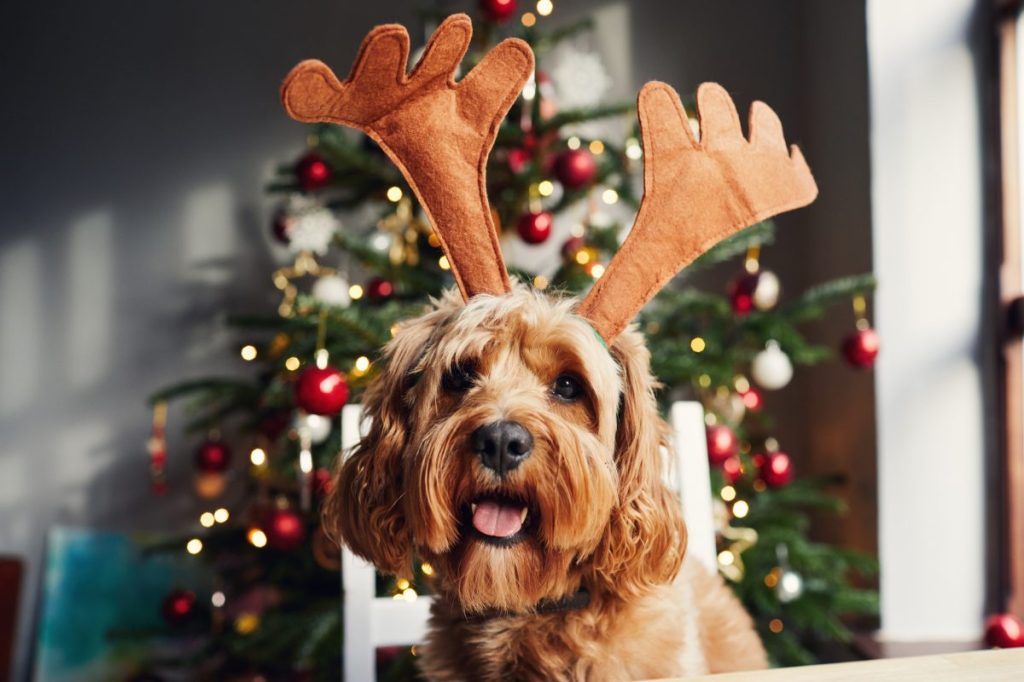When decking the halls this holiday season, pet owners should be aware of potential dangers for furry family members. From the alluring twinkle of a Christmas tree to the tempting aroma of treats, more than a few of our favorite things can cause serious harm to our pups. These are the top holiday hazards for dogs and pet safety considerations to ensure you enjoy the season snuggled up at home with your canine instead of in the vet’s office.
Table of contents
Christmas trees
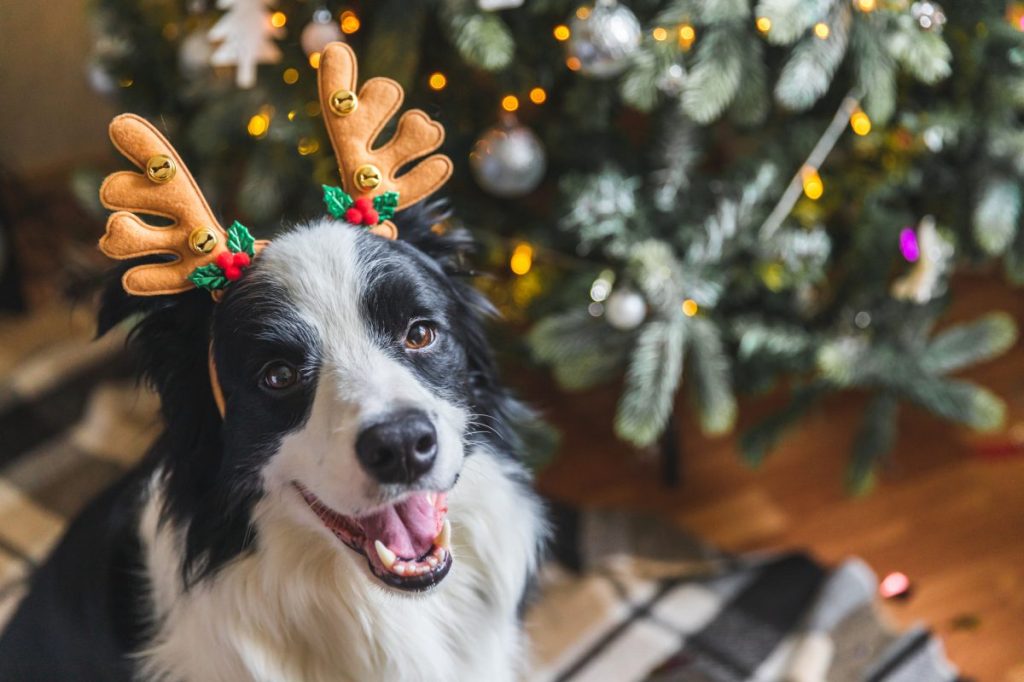
While Christmas trees are a beloved part of the season, they can also be a source of curiosity and subsequent danger for dogs. Filled with enticing scents, sparkling ornaments, and glowing lights, it’s understandable that pets might be drawn to these festive symbols. Fir, spruce, and pine trees — popular choices for Christmas trees — are typically safe for dogs. However, ingesting needles may cause digestive issues, and certain tree oils can irritate your pup’s mouth and stomach. Oils can also find their way to the tree water, risking an upset stomach if your dog drinks it. To avoid this, cover the stand or use a pet-proof tree skirt.
Ensure your Christmas tree is securely anchored to prevent it from being knocked over by curious pets. In so doing, you’ll be protecting your decorations and preventing injuries. While dogs may be more well-behaved around a Christmas tree than cats, it’s always a good idea to keep an eye out for potential accidents.
Holiday decorations
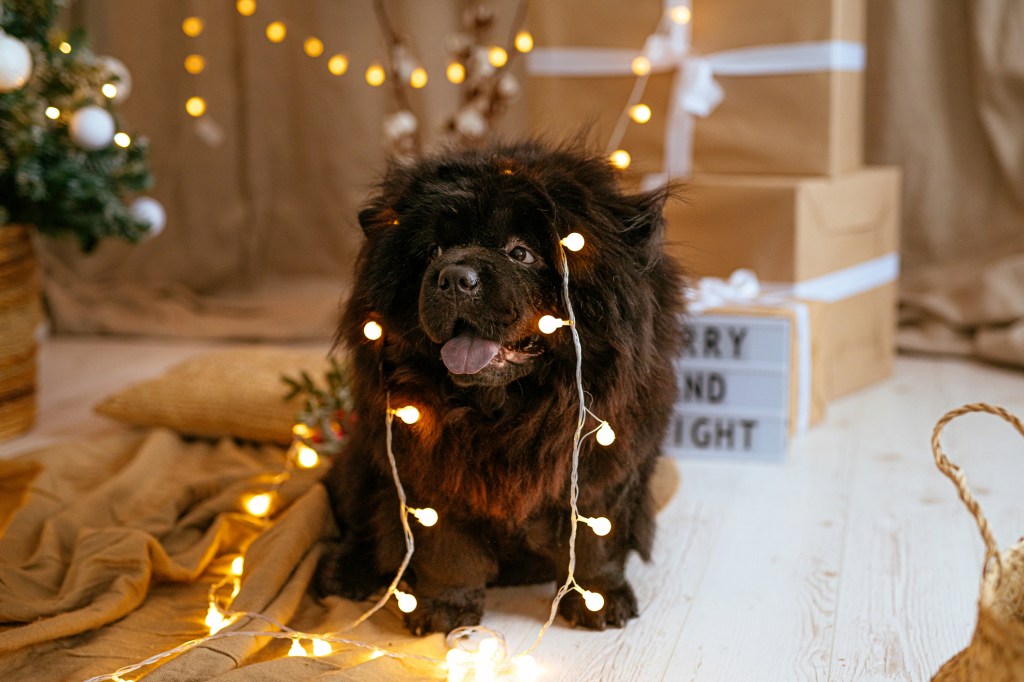
Decorations are beautiful, whether hung by a fire or hanging from old Tannenbaum. That said, there are a myriad of pet holiday safety concerns when it comes to the very things that make the season bright.
Electrical and extension cords
If you have a pet prone to chewing, be cautious of electrical cords. Biting down on them can lead to electrical shock, tongue lacerations, and even death. Regularly inspect your holiday lights for signs of wear or chewing, and opt for a grounded three-prong extension cord for added safety.
Candles
When displaying candles, position them in a hard-to-reach location to prevent access by pets. In addition to the risk of severe burns, knocked-over candles pose a fire hazard. They can also leave hot wax trails that may burn paw pads and more.
Tinsel
Though non-toxic, tinsel holds a significant risk for pets, especially cats, due to its shiny, reflective nature and enticing movement. When ingested, tinsel can lead to severe injuries, potentially becoming fatal as it twists and bunches inside the pet’s intestines. Immediate veterinary attention is essential.
Artificial snow
Artificial snow products can also be harmful if ingested. Avoid using them if you have pets in the house. Put differently, maybe don’t “let it snow” if you have to manufacture it this season.
Christmas tree ornaments and other holiday decorations
Colorful tree ornaments, particularly those made from glass, aluminum, and paper, can also attract a pet’s curiosity. To prevent accidents, place these delicate decorations higher on the tree. Pets may chew and swallow them, posing dangers such as lacerations to the mouth, throat, and intestines. Moreover, they are also a choking hazard.
Salt-dough ornaments may harm pets, as they can contain significant amounts of table salt — even up to a cup. Just 1 ½ teaspoons of salt, equivalent to the amount in 1 ½ batches of chocolate chip cookie dough, could be fatal for a 10 lb. pet, according to the Pet Poison Helpline.
Festive plants
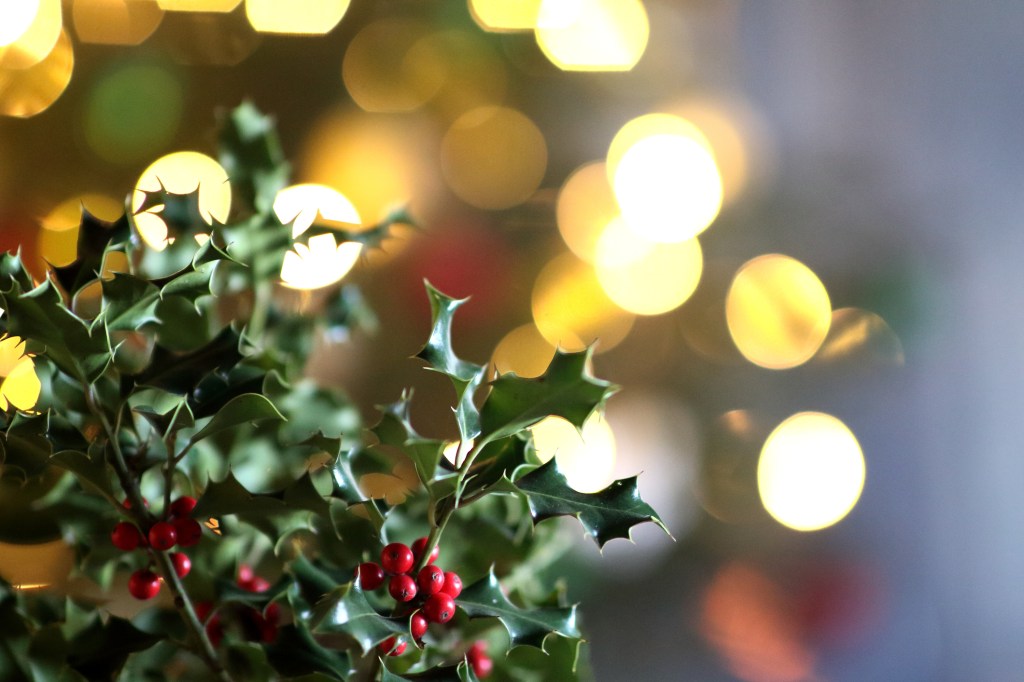
Poinsettias are a popular Christmas decoration, but their milky white sap contains toxins called diterpenoids. These toxins can irritate the mouth and stomach, leading to vomiting, diarrhea, and drooling. Despite the reputation, poinsettia ingestion likely won’t lead to death but can be uncomfortable for your dog and require veterinary attention.
Mistletoe similarly contains a mildly toxic substance called phoratoxins. These toxins can cause nausea, vomiting, diarrhea, and abdominal pain in dogs if ingested. While the berries are the most poisonous part of the plant, all mistletoe parts can cause some discomfort.
Chowing down on holly leaves or berries might give your dog a bit of a tummy ache and make them feel sluggish. If they happen to munch on a large quantity, they may have difficulty walking. Usually, the symptoms of holly ingestion are on the milder side and sort themselves out.
To keep your dog safe from holiday plant hazards during Christmas, place plants out of reach, utilize hanging baskets or high shelves, and promptly clean up fallen leaves or berries. If you suspect hazardous holiday plant ingestion, immediately contact your veterinarian. And, if your pup becomes seriously ill, don’t hesitate to call the Pet Poison Helpline at 855-764-7661 for guidance on what to do next.
Favorite foods and sweet treats
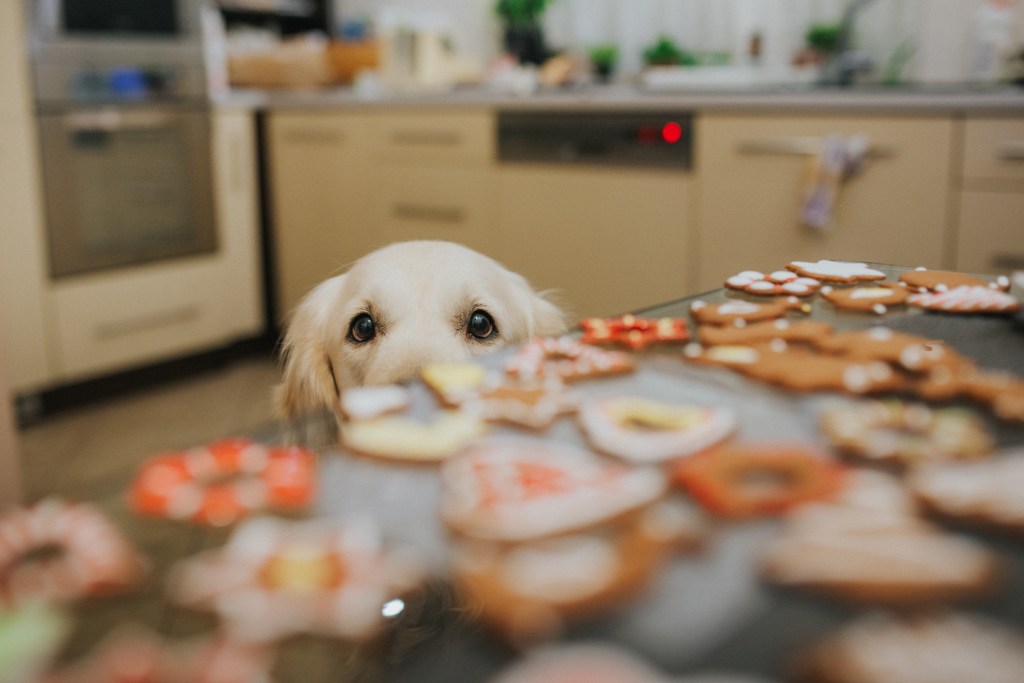
There is often an abundance of our favorite foods during the holidays, most of which your pup will find irresistible. While sharing human treats with your dog may seem like a gesture of love, it’s important to remember that certain foods can cause severe or fatal complications.
While chocolate is an obvious hazard to pet parents, there’s always a risk of leaving a bag of chocolate chips on the kitchen counter at just the right height for eager snouts. Chocolate comes in various forms, each with varying amounts of fat, caffeine, and methylxanthine. Broadly speaking, the danger of toxicity increases with the color and richness of the chocolate (i.e., baker’s chocolate). Depending on the kind and quantity consumed, dogs that eat chocolate may exhibit gastrointestinal distress, cardiac arrhythmias, tremors, seizures, and vomiting.
Bones, especially poultry bones, can cause severe problems if ingested. In addition to being a choking hazard, bones can splinter and pierce your dog’s mouth, throat, digestive tract, or even internal organs. In turn, this can lead to severe pain, bleeding, and internal injuries. While you may consider bones trash, your pup likely has other ideas. Keep a close eye on your trash can, use a child-safety lock, or immediately take out the garbage to avoid any surprise snacking.
In addition, both cooked and uncooked fat trimmings can trigger pancreatitis in dogs. This painful and potentially life-threatening condition arises when the pancreas becomes inflamed due to excessive fat intake. Keep this in mind if you’re a pushover when it comes to giving your pup table scraps! Other human foods to be aware of keeping from your dog include alcohol, certain kinds of nuts, and sugar-free foods containing xylitol.
Gift wrapping, ribbon, and bows
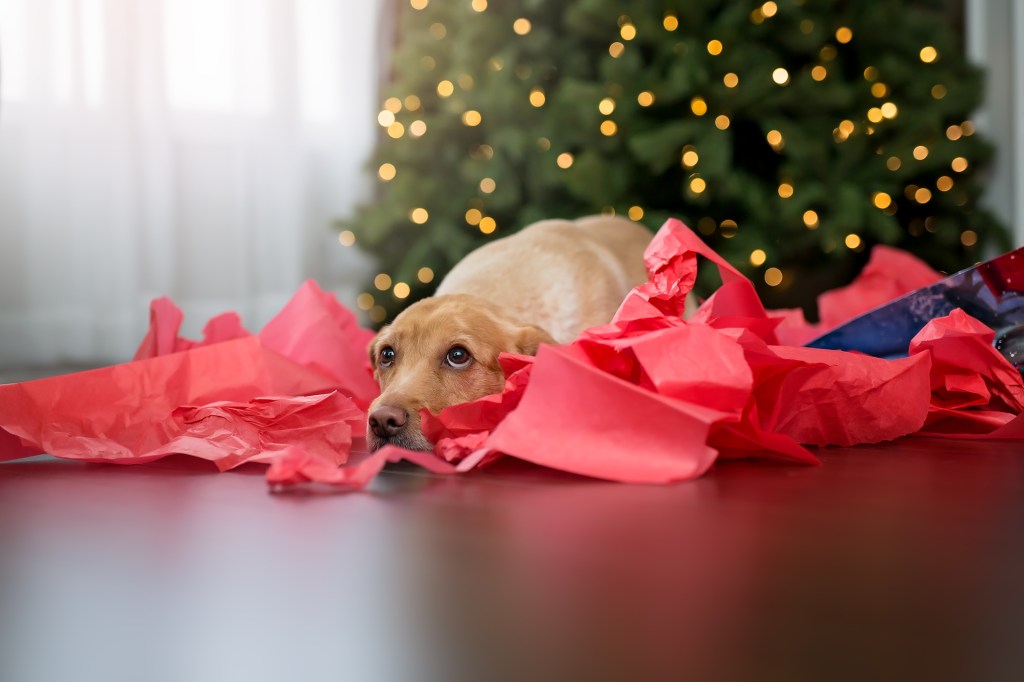
The colorful allure of gift wrap and ribbon can be irresistible to curious pets, especially if left under the tree unsupervised. However, these materials are a holiday hazard for dogs and can cause serious problems if ingested. Ribbon poses a choking hazard and can quickly become entangled in the intestines while wrapping paper can irritate the digestive system and cause blockages. The dyes and chemicals in wrapping paper can also upset your pet’s digestive system, leading to vomiting, diarrhea, and abdominal pain.
While some pets have little interest in paper and bows, it’s always best to play it safe. You can opt for pet-safe wrapping made from natural materials without enticing shiny, glittery, or metallic finishes. It may also be best to securely store wrapped presents to avoid any mischief!
Holiday hazards and pet safety precautions
Always supervise your pets around the Christmas tree, decorations, and food. Contact your veterinarian immediately if you notice any signs of illness or think your pup may have ingested harmful substances. By being aware of these potential holiday hazards for dogs and taking precautions, you can ensure a safe and festive holiday season. Remember, a healthy and happy dog is the best gift of all!
